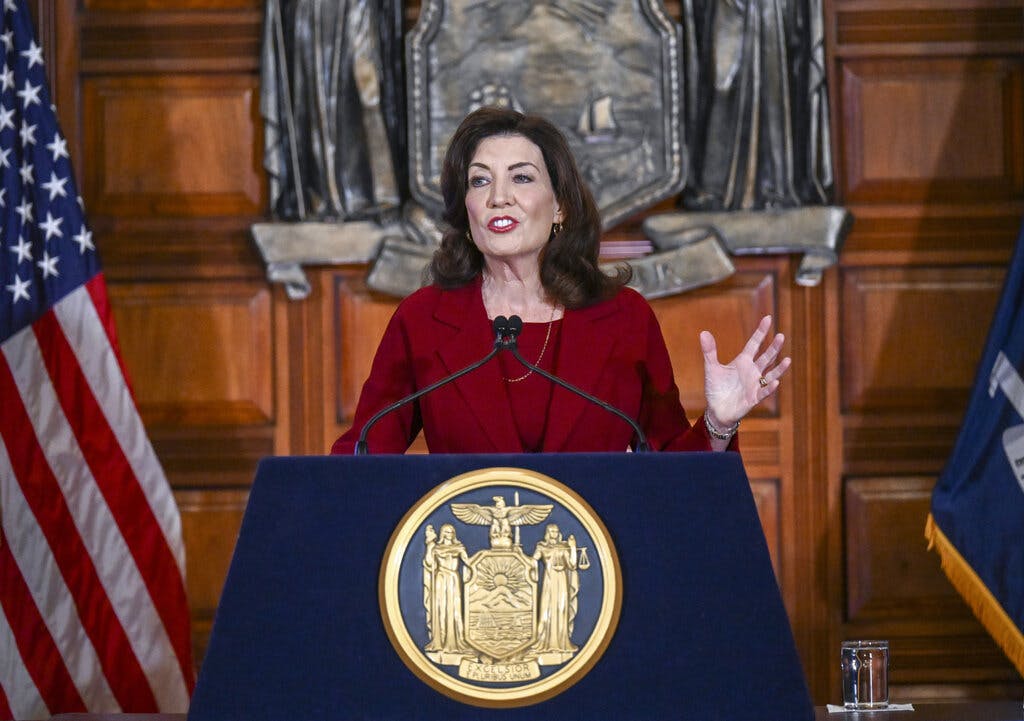Law Professor and Truth Social Score Constitutional Win
A judge rejects a New York law passed in the wake of a mass shooting.

The decision by a federal judge to enjoin New York’s Hateful Conduct Law — passed in the wake of a massacre of Black Americans at a supermarket at Buffalo — brings into focus the conflict between efforts to clamp down on vitriol online and the First Amendment of the Constitution.
The decision was a courtroom victory for an unlikely set of plaintiffs: an online video platform that hosts President Trump’s Truth Social website, Rumble, and a law professor, Eugene Volokh, who runs a legal blog, the Volokh Conspiracy.
The law, passed in 2021, came after that killing spree was recorded on Twitch and then reposted on 4chan and Reddit. New York’s attorney general found that “online platforms should be held accountable for allowing hateful and dangerous content to spread on their platforms.”
That finding in hand, Governor Hochul signed the Hateful Conduct Law, which creates a mechanism for users to file complaints about “hateful conduct,” defined as the “use of a social media network to vilify, humiliate, or incite violence against a group or a class of persons” on the basis of various categories. Those mechanisms must then be disclosed to the public.
Judge Stephen Carter ruled the Hateful Conduct Law unconstitutional because its disclosure policy “requires that social media networks devise and implement a written policy,” a form of coerced speech. Failures to implement or disclose these policies would expose platforms to prosecution by the attorney general and a suite of civil penalties.
Judge Carter held that the Hateful Conduct Law “forces Plaintiffs to publish a message with which they disagree,” meaning the definition of “hateful conduct” or policies to combat it. The jurist held that these requirements were not “commercial speech” like “caloric information or mercury content,” which is subjected to lighter judicial scrutiny.
Instead, because the “Hateful Conduct Law regulates speech based on its content, the appropriate level of review is strict scrutiny,” as the speech in question is protected by the Constitution. Strict scrutiny is a demanding standard of judicial review under which few laws pass muster.
While the government argued that the law is essential for combating mass shootings, Judge Carter was unconvinced, arguing that it is “unclear what, if any, effect a mechanism that allows users to report hateful conduct on social media networks would have on reducing mass shootings.”
For Judge Carter, “it is hard to see how the law really changes the status quo,” and thus its infringements on the First Amendment are not owed constitutional deference. By regulating platforms, it “fundamentally implicates the speech of the networks’ users.”
Mr. Volokh, who teaches at the University of California, Los Angeles, told the Sun that he saw this as a “straightforward case,” noting that the Supreme Court has “long said that viewpoint-based laws are almost never constitutional.” He sees Governor Hochul’s law as emblematic of a “broader political movement” that seeks to restrict speech.
The First Amendment, Judge Carter explains, protects “individuals’ right to engage in hate speech, and the state cannot try to inhibit that right, no matter how unseemly or offensive that speech may be to the general public or the state.” Efforts in that direction “could have a profound chilling effect on social media users and their protected freedom of expression.”
Judge Carter did reject the argument by Mr. Volokh and Rumble that the Hateful Conduct Law is preempted and protected by Section 230 of the Communications Decency Act, which offers broad liability protections to websites that are unavailable to traditional publishers.
A case involving that provision, Gonzalez v. Google, was argued before the Supreme Court on Tuesday.

